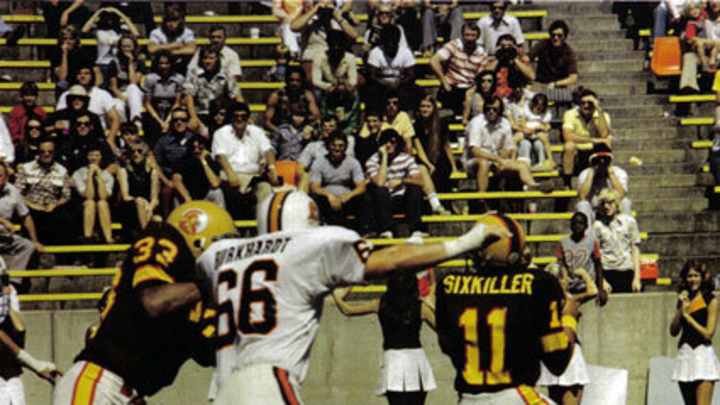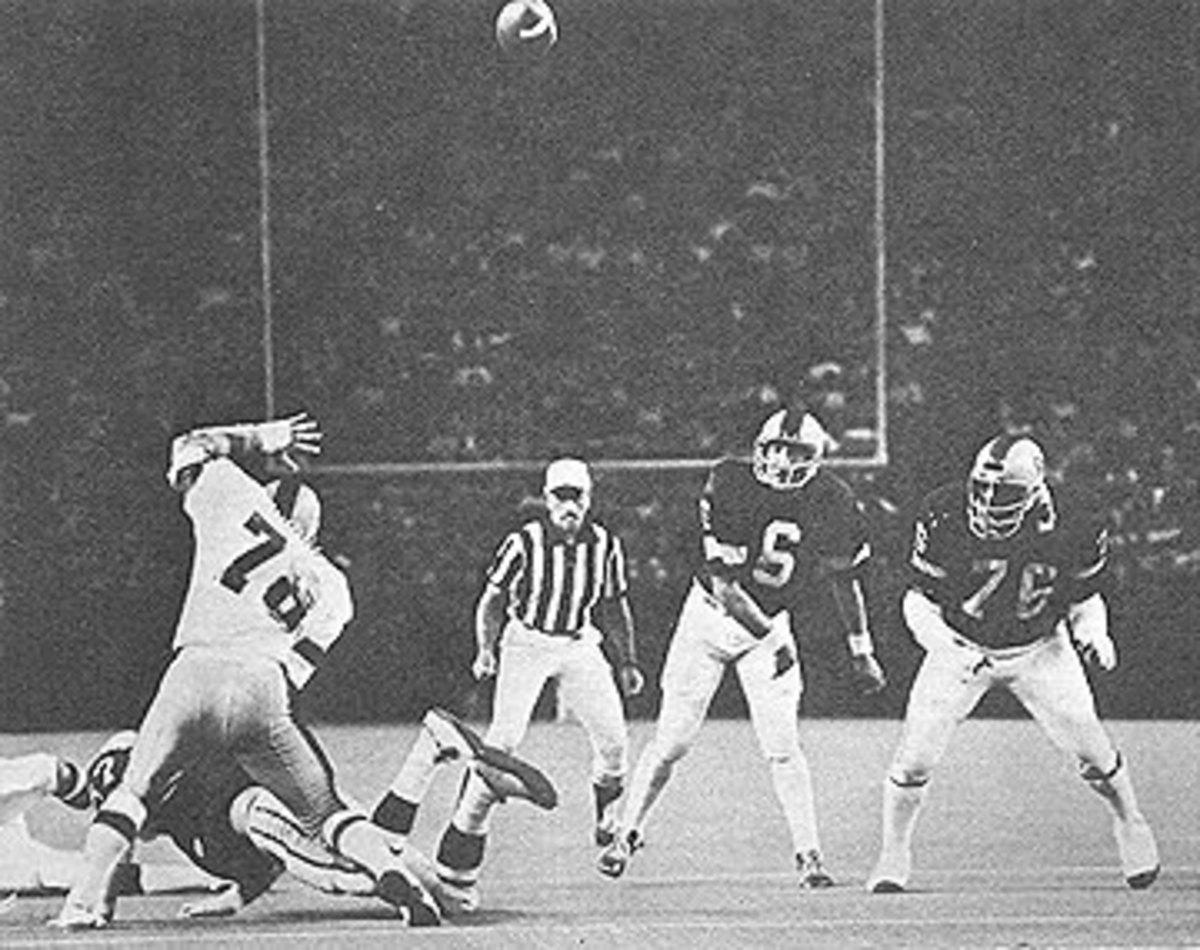What in the World: Sixkiller Finally Got His Pro Football Shot in Hawaii

Amid the palm trees and the pounding surf, Sonny Sixkiller found a pro football home. From a wardrobe standpoint, it wasn't paradise.
He pulled on a burnt orange, gold and red uniform for the Hawaii Hawaiians of the World Football League. The color scheme made it appear that he played for the University of Wyoming.
Sixkiller saw a more apt comparison to a Major League Baseball team owned by a hamburger king.
"We looked like the old San Diego Padres," he said.
After unsuccessful NFL and CFL tryouts, missing out on a pair of seasons and making a Burt Reynolds movie, the former University of Washington quarterback wasn't going to quibble over football fashion.
Somebody finally was willing to pay him to throw a football. The atmosphere wasn't anything to sniff at either.
"It was Hawaii," said Sixkiller, who wore a couple of jersey numbers, including his trademark No. 6. "You can't go wrong with that."
The WFL was the new game in town. Overly ambitious. Globally motivated. Full of wild promises.
The extra pro football league vowed to compete with the NFL for players and fans. Its long-term goal was to establish franchises all over the world, in cities such as Tokyo, Madrid, London, Paris, Rome, Tel Aviv and Mexico City. It intended to host the World Bowl at the end of each season.
Sixkiller joined the WFL in 1975, its second year of operation. Honolulu remained the league's most far-flung football outpost. The lack of a TV contract ultimately spoiled everyone's grand plans for international expansion.
The year before, Sixkiller had returned to the Northwest and received a one-day tryout with the Philadelphia Bell — in Oregon.
Hours before the Bell played the Portland Storm, Sixkiller threw passing routes and landed a one-year future contract.
"Sonny's extremely intelligent and capable," Bell coach Ron Waller said at the time. "He has a quick, major-league release and a strong arm. He'll get a good look."
Sixkiller, while working as an insurance salesman in the Seattle suburbs, drew 10 months of WFL checks but he never played for the Philadelphia franchise.
He joined the Hawaiians who were building around Calvin Hill, the Dallas Cowboys' running back great and the father of a then 3-year-old son named Grant, who would make his mark in the NBA.
Sixkiller received a car and a place to stay. He and his wife Denise shared a house just outside of Honolulu with Rick Cassata, a former Syracuse and CFL quarterback, and his spouse.
The WFL proved grueling at times. The Hawaiians began the season with an 18-day, 5,000-mile road trip that consisted of a preseason game in Jacksonville, Florida, and regular-season games in Philadelphia and Portland, Oregon.
In the opener at Philly, Sixkiller came off the bench with Hawaii trailing 18-8 and threw an apparent game-winning TD pass at the end, only to have it nullified by penalty in a 21-15 loss.
In Portland, Sonny left the sidelines and ran for a two-point conversion that made the Hawaiians 25-24 winners. Sixkiller completed 8 of 15 passes for 58 yards and his first pro TD pass, an 8-yarder to Grady Richardson.
He watched as wide receiver Jim Krieg, his one-time No. 1 UW passing target, caught a 39-yard scoring pass, and former Husky cornerback Phil Andre returned a fumble 43 yards for a TD for Portland.
"It's the most I've played since college," Sixkiller told reporters. "I played a half in Canada, but this is the first time I've had a real good chance. I was nervous at first."
The Hawaiians returned home to play the Southern California Sun and the game was a disaster. Calvin Hill suffered a season-ending knee injury, with the team still owing him $500,000, and it came up a 37-19 loser.
The headline in the Honolulu Advertiser proclaimed: "Sun Beats the Hill Out of Hawaiians."
In the fourth game, Sixkiller passed for 186 yards and three touchdowns, two in the fourth quarter, to beat the Chicago Wind 28-17 in Hawaii. It was his WFL coming-out party.
Hawaii next traveled to Memphis and lost 37-17. Sixkiller came off the bench, got sacked three times and completed just 6 of 18 passes for 68 yards.
Back home in the islands, Sonny had his most memorable pro outing for multiple reasons. He drew his first WFL starting assignment against the Jacksonville Express. Honolulu opened its glitzy new Aloha Stadium, which replaced wooden and antiquated Honolulu Stadium. And he was good that night
"He has proven he can come off the bench and rally the team, and he deserves a chance to start," Hawaiians coach Mike Giddings said before kickoff.
On a perfect evening, a crowd of 18,479 came out to see the stadium, popular singer Don Ho, native dancers and Sixkiller in action.
Sonny threw three touchdowns to Tim Delaney of 18, 15 and 16 yards — he went into the record book as the first to rifle a scoring pass in the new facility — in a 33-15 win over the Express. At halftime, he was honored in a ceremony recognizing American Indian Day.

The season went downhill from there.
Sixkiller and Cassata split time at quarterback as the Hawaiians lost to the San Antonio Wings 30-11, the Shreveport Steamer 32-25 and the Birmingham Vulcans 29-16 before beating Philadelphia 14-13.
Everything came abruptly to an end for the Hawaii quarterbacks. Steadily losing money, the front office asked everyone to take healthy pay cuts. Sonny was asked to accept $250 per game instead of $500.
Sixkiller and Cassata up and quit. They had contractural guarantees set up to pre-empt any such downturn. Sonny was done after appearing in 10 games and completing 72 of 144 passes for 799 yards and 7 touchdowns.
In desperation, the Hawaiians hired California truck driver Jim Fassel and Honolulu City Hall employee Milt Holt to replace them against Southern California. Fassel later became the New York Giants head coach; Holt had been in camp before as a Harvard quarterback. The revamped Hawaii team lost to the Suns 26-7.
"Rick and I went to the game," Sonny said. "We'd taken a vote in the locker room and the whole team voted not to take pay cuts. Rick and I were the only ones who held out. We said, 'Bleep it, we're just not doing that.' There was no animosity from the guys toward us."
The following week, the bottom fell out on the WFL. On October 22, 1975, the league folded for good during week 12 of 20.
"I remember laying on the beach when they called the season," Sixkiller said. "We were having fun."
Follow Dan Raley of Husky Maven on Twitter: @DanRaley1 and @HuskyMaven
Find Husky Maven on Facebook by searching: HuskyMaven/Sports Illustrated
Click the "follow" button in the top right corner to join the conversation on Husky Maven. Access and comment on featured stories and start your own conversations and post external links on our community page.
